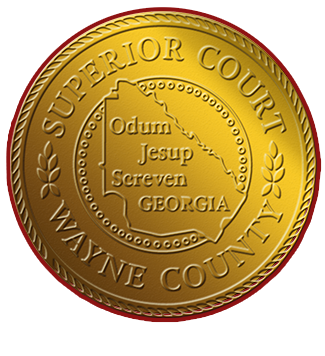WAYNE COUNTY’S JUDICIAL SYSTEM
HISTORICAL INFORMATION
The Georgia Constitution of 1798 created the justice of peace court, the inferior court and the superior court. A justice of peace court was provided in each community for the purpose of trying minor civil cases. The inferior court–a court made up of five justices of the peace for a county–was established to try any civil case except those involving title to land. The inferior court had jurisdiction over county business matters, such as care of the poor, maintenance of jails, building of roads, and maintaining a register of wills. A court of the ordinary was created in 1851 for registering wills, granting letters of administration for the estates of deceased persons and issuing marriage licenses. The “ordinary” was given the responsibility of managing county business and, thus, became the chief administrative officer for county government. In 1868, the inferior courts were abolished, and all of their powers were given to the courts of ordinary, which became the office of the probate court in 1983, when the Constitution was amended. The Constitution of 1877 created county commissioners “in any counties that require them.” Gradually county commissioners assumed the responsibilities that they have today–that is, levying county taxes, construction of county roads, and other county matters.
The superior court was established under the Constitution of 1798 as the highest court in the state. Georgia’s first constitution (1777) established a superior court of final jurisdiction for each county. The state was divided into eight counties then. Originally there was one chief justice who traveled from county to county holding court. In 1789, the state was divided into two judicial districts, the Eastern District and the Western District. Wayne County was placed in the Eastern District. Later it was placed in the Brunswick Judicial Circuit, in which it currently remains. There were two judges appointed by the legislature, one for each district. The judges “rode circuit,” holding court in each county at least twice a year. We now have four Superior Court Judges who rotate in our court system.
SUPERIOR COURT
Throughout Georgia’s history, the superior court has been the court in which serious criminal cases and more important civil cases have been tried. Until 1845, their decisions were final. Since that date, they have been subject to review by appellate (appeals) courts in Georgia and the United States Supreme Court.
The superior court is Georgia’s general jurisdiction trial court. It has exclusive constitutional authority to preside over felony cases (except those involving juvenile offenders, in which jurisdiction is shared with the juvenile court) and cases regarding title to land, divorce and equity. The superior court also has exclusive jurisdiction in such matters as declaratory judgments, habeas corpus, mandamus, quo warranto, and prohibition.
The superior court may exercise concurrent jurisdiction over other cases with the limited jurisdiction courts located in the same county (state court, magistrate court, and probate court). The superior courts are authorized to correct errors made by lower courts by issuing writs of certiorari, and for some lower courts (municipal court and recorder’s court), the right to direct review by the superior court applies.
Georgia is divided into 45 superior court judicial circuits (see attachment ), with at least one judge in each. The circuits in metropolitan areas have several judges. In the Atlanta Judicial Circuit in 1994, there were 15 superior court judges. Currently there are 146 superior court judges in Georgia’s 159 counties. Wayne County shares four superior court judges with the other five counties of the Brunswick Judicial Circuit (Appling, Camden, Glynn, Jeff Davis and Wayne counties). They are: Anthony Harrison (Camden), Stephen D. Kelley (Glynn), Stephen G. Scarlett (Glynn), E.W. Wilkes, III (Jeff Davis), Roger B. Lane (Glynn) serve as senior superior court judges.
Superior court judges are elected to four-year terms in non-partisan, circuit-wide races. To qualify as a superior court judge, a candidate must be at least 30 years old, a citizen of Georgia for at least three years and have been authorized to practice law for at least seven years. Senior superior court judges, who have retired from the bench and who have attained senior status, may hear cases in any circuit at the request of the local judges or an administrative judge.
The Clerk of Superior Court, Elouise Ogden, is elected and serves a four-year term.
The superior court is a court of record, meaning that all documents must be filed in court. The clerk of the superior court is statutorily designated as the receiver and custodian of the records of the superior court. A constitutional, county officer, the clerk is statutorily responsible for all moneys paid into the court; the safekeeping, preservation, and management of all documents, orders and decrees of the court; jury management; and provides management and clerical support for the court. The clerk of superior court also is the register of real and personal property records, the clerk of the jury commission and, serves as clerk of two other courts (juvenile court, state court). The Clerk of Wayne Superior Court serves as the clerk of juvenile court and state court. The Office of the Clerk of Superior Court is located at 174 North Brunswick Street in the Annex Building behind the Wayne County Courthouse.
A district attorney is elected for each judicial circuit of the state. The district attorney is the prosecutor in felony criminal matters. Jackie Johnson is the district attorney for the Brunswick Judicial Circuit. The district attorney serves as the legal advisor to the grand jury, which is required to hear evidence in criminal matters to determine if a “true bill” or “no bill” should be returned on criminal indictments. If the grand jury returns a true bill of indictment, the accused is bound over for trial in the matter. A no bill of indictment is a dismissal of charges against the accused. The district attorney also provides legal counsel to the Brunswick Judicial Circuit Child Support Recovery Unit and to the juvenile courts of the circuit. The local district attorney’s office is located at 145 North Brunswick Street, Jesup, Georgia.
The court’s caseload is divided into two divisions, civil and criminal, with a case assignment system used in the civil division for equally distributing the civil caseload to the four judges. Each division requires and provides for jury trials in which jurors are selected and impaneled to decide issues between parties. Twelve-person juries are required for all cases, unless the parties agree to proceed with as few as eleven jurors.
Jury lists are compiled by the jury commission of the county. The jury commission is composed of six persons who are appointed for six-year terms by the chief judge of the circuit. Jury commissioners serve staggered terms, with two commissioners rotating off the commission each year.
The clerk of superior court is required by statute to maintain the jury lists of the county. All jurors, once summoned for jury duty, are required to serve. The only reasons for excusal from jury service provided for by law are:
(1) death;
(2) a permanent physical or mental disability (in which case an affidavit must be provided by a medical doctor, psychiatrist, or psychologist);
(3) a felony conviction; and
(4) residency (that is, the juror no longer resides in the county).
A juror may deferred for one term of court if the juror is:
(1) temporarily physically or mentally unable to serve (an affidavit from a medical doctor, psychiatrist, or psychologist must be provided);
(2) the sole provider of care for a child or children under the age of five and for whom no one else is available to provide such care;
(3) the provider of care for an ill or disabled family member; or
(4) employed in a job necessary to the public well-being (such as a police officer, medical doctor, or nurse) and no one is available on the date the juror has been summoned for court to take the juror’s place.
An adjunct of the superior court is the State Probation Office, a division of the Georgia Department of Offender Rehabilitation. The probation office is part of circuit-wide probation office. Probation officers employed by the department are required by law to supervise any person convicted of a felony offense in which a sentence of probation is adjudged. The chief probation officer is appointed by the chief judge of the circuit.
JUVENILE COURT
The purpose of Georgia’s juvenile courts is to protect the well-being of children, to provide guidance and control conducive to a child’s welfare and the best interests of the state, and to secure as nearly as possible care equivalent to parental care for a child removed from the home. All juvenile court proceedings are closed to the public and all files pertaining to cases are confidential.
The juvenile court has exclusive jurisdiction over cases involving delinquent and unruly children under the age of 17, and deprived children under the age of 18. Juvenile courts have concurrent jurisdiction with the superior courts in cases involving capital felonies, custody and child support cases, and in proceedings conducted to terminate parental rights. The superior court has authority to preside over adoption proceedings. These courts administer supervision and probation cases for those persons under 21 years of age who were sentenced for a delinquent offense committed before age 17. Additionally, the juvenile court has jurisdiction over those cases involving enlistment in the military services and consent to marriage for minors and cases that come under the Interstate Compact on Juveniles.
STATE COURT
A 1970 legislative act established Georgia’s state court system by designating certain countywide courts as courts of limited jurisdiction. State courts exercise jurisdiction over all misdemeanor violations, including traffic cases, and all civil actions, regardless of the amount claimed, unless the superior court has exclusive jurisdiction (e.g., divorce, title to land, child custody, adoption, and legitimization).
State courts are authorized by statute to hold hearings regarding applications for and issuance of search and arrest warrants and to hold preliminary hearings. These courts may also punish contempt by imposing a fine and/or a jail sentence. By constitutional provision, the state courts have the authority to review lower court decisions, if the power is provided by statute.
State court judges may practice part-time, except in their own courts. They are elected to four-year terms in non-partisan, countywide elections. Candidates must be 25 years old, have practiced law for at least five years, and have lived in the county for at least three years. State court judges can serve as superior court judges upon appointment by the chief judge of the superior court.
When required, jury trials may be held for civil and criminal matters. By law, six-person jury panels are provided for in state court.
DRUG COURT
The history of Drug Courts can best be summarized from a June 29, 2000 news release by Attorney General Janet Reno:
Justice Department Grants to Help 99 Communities
Assist Non-Violent Offenders with Drug Problems
WASHINGTON, DC – The Justice Department today announced that it will provide more than $25 million to 99 communities to help them monitor non-violent, substance abusing offenders, through drug courts that oversee their rehabilitation and use sanctions to keep them on the right track. The grants to plan, implement or enhance drug courts will be made by the Justice Department’s Office of Justice Programs (OJP).
“Over the past 10 years, we have seen drug courts go from a concept to a full-fledged, successful initiative with more than 500 courts operating across the nation,” said Attorney General Janet Reno. “These courts are helping offenders become drug-free, responsible members of their communities.”
Participants in the initiative are less likely to commit crimes after graduating from a drug court. In Escambia County, Florida, 36 months after admission to the drug court program, only 48 percent of the program graduates were re-arrested as compared to 86 percent of non-graduates and 63 percent of offenders who were sentenced to probation. In Jefferson City, Kentucky, only 13 percent of the program graduates were re-arrested for a felony one year after graduation, while 55 percent of eligible offenders who declined to participate in the program were re-arrested for a felony during that same time period.
Thirty-eight of today’s grants – totaling more than $5 million will help Native American tribes. The U.S. Department of Health and Human Services’ Substance Abuse and Mental Health Services Administration’s 1997 National Household Survey on Drug Abuse reported that compared to the total U.S. population, Native Americans have higher rates of drug use and alcohol dependence and a higher need for drug abuse treatment.
“We are pleased to be able to help tribal governments use these effective courts to manage and assist offenders who have substance abuse problems,” said OJP Acting Assistant Attorney General Mary Lou Leary.
Since the drug court program was authorized in the President’s 1994 Crime Act, OJP has made approximately 650 grants totaling more than $125. More than 500 drug courts are operating in the United States and more than 280 are being planned. All 50 states have drug courts in operation or in the planning stages. Twenty-two states have enacted legislation that authorizes or funds drug courts and 12 additional states are considering such legislation.
More than 3,500 participants who lost custody of their children have regained custody after participating in the drug court program. More than 4,500 participants have become current in child support payments after graduating from a drug court.








